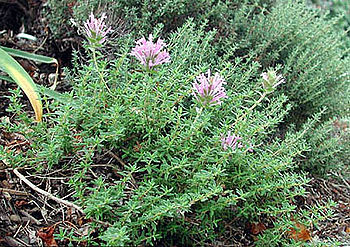Thyme
Other names : Thymus vulgaris, Common Thyme, Farigoule, Farigoulette, French Thyme, Frigoule, Garden Thyme, Huile Essentielle de Thym, Huile de Thym, Huile de Thym Blanc, Huile de Thym Rouge, Mignotise des Genevois, Oil of Thyme, Pote, Red Thyme Oil, Rubbed Thyme, Serpolet, Spanish Thyme, Thym, Thym Citron, Thym Commun, Thym des Jardins, Thym Maraîcher, Thym Vrai, Thym Vulgaire, Thyme Aetheroleum, Thyme Essential Oil, Thyme Oil, Thymi herba, Thymus vulgaris, Thymus zygis, Tomillo, Van Ajwayan, Vanya Yavani, White Thyme Oil.
Thyme is a perennial garden herb that has been employed since ancient times for medicinal and culinary uses. The World's Healthiest Foods notes that thyme has traditionally been associated with courage, with medieval women giving sprigs of thyme to knights going into battle; it has also been used as an herbal remedy for a host of ailments. Thyme tea, rich in volatile oils, minerals, beneficial phenols and flavonoids, is a healthy beverage choice.
See also : Thymol
Special Precautions of Thyme
- Thyme is safe when consumed in foods and taken as medicine for short periods of time. It can cause digestive system upset.
- Thyme oil also seems to be safe when applied to the skin. In some people, applying the oil to the skin can cause irritation. But there isn’t enough information to know whether thyme oil is safe to take by mouth in medicinal doses.
- Pregnancy and breast-feeding: Thyme is safe for pregnant and breast-feeding women when consumed in normal food amounts. But it’s not known whether it’s safe to use thyme in larger medicinal amounts. Stick to food amounts if you are pregnant or breast-feeding.
- Allergies: People who are allergic to oregano might also be allergic to thyme.
- Surgery: Thyme might slow blood clotting, so there is some concern that it might increase the risk of extra bleeding during and after surgery. Stop using thyme at least 2 weeks before a scheduled surgery.
- Medications that slow blood clotting (Anticoagulant / Antiplatelet drugs) interacts with thyme.
The benefits of Thyme are
- Antioxidant Properties : A cup of thyme tea has a lot more to offer than its pleasant taste; thymol, one of the volatile oils in thyme, is a potent antioxidant. According to The World's Healthiest Foods, thymol may help to increase omega-3 fatty acids, or healthy fats, in brain cells. In a clinical study conducted by K.A. Youdim and colleagues and published in the April 19, 1999 issue of "Biochemical and Biophysical Research," researchers found that thyme oil helped to protect against age-related changes in the brain cells of rats. Studies are ongoing to determine whether thyme can help prevent Alzheimer's disease. In addition to thymol, thyme tea contains the antioxidant flavonoids apigenin, naringenin, luteolin, and thymonin.
- Soothes Coughs : The next time you have a cold or cough, try a cup of thyme tea. The University of Maryland Medical Center says it can help treat bronchitis and relieve coughs, and states that thyme has been approved for this use by the German Commission E, which evaluates safety and efficacy of herbal preparations in Germany. Drugs.com, a website which offers peer-reviewed information to consumers, concurs, saying that extracts from thyme have shown relaxant and bronchodilatory effects.
- Respiratory Diseases : as a lung remedy consumed since antiquity it is used extensively to day to prevent and treat respiratory tract infections and bacterial infection pneumonia. Thyme is very powerful in the fight against chest congestion. It produces powerful antiseptic essential oils which are classified as naturally antibiotic and anti-fungal.
- Relieves Indigestion : Thyme tea is often recommended by herbal healers to promote good digestion and relieve gas and bloating. According to "Aromatherapy for Professionals," by herbalists Shirley and Len Price, the volatile oils in thyme give it carminative --or gas-reducing-- properties, while its phenols allow it to work as an antispasmodic, helping to relieve intestinal cramping
- Provides Essential Minerals : When you think of a food rich in iron, thyme is probably not the first thing to come to mind. But 2 tsps. of dried thyme --about the amount used in a cup of thyme tea-- delivers 3.56mg, or 19.8 percent of the recommended daily value of iron, causing The World's Healthiest Foods to list it as an excellent source. Thyme tea is also an excellent source of vitamin K, vital to normal blood clotting, with 2 tsps. supplying 48.01mcg, or 60 percent of the DV. Thyme tea is also a very good source of manganese, supplying 12 percent of the DV, and calcium, providing 5.4 of the DV in 2 tsp.
- Lung Cancer, Oral Cancer and Ovarian Cancer : Oil from the common herb thyme was discovered to kill up to 97% of human lung cancer cells. Recent research has shown that if you mix thyme and olive oil it will enhance the availability of hydroxytyrosol, olive oil’s most potent anti-cancer compound.
- Prostate Cancer : Contains carvacrol. This compound is found in an array of plants and herbs including Wild Bergamot, thyme, pepperwort and especially Oregano.
- Breast Cancer : In lab tests Wild Thyme caused cell death in the breast cancer cells.
- Sore Throat : used in the following recipe is a classic gargle, but other herbs such as marjoram, Sage or hyssop can replace it.1 cup boiling water + 2 teaspoons fresh or dried leaves + ¼ ounce salt
